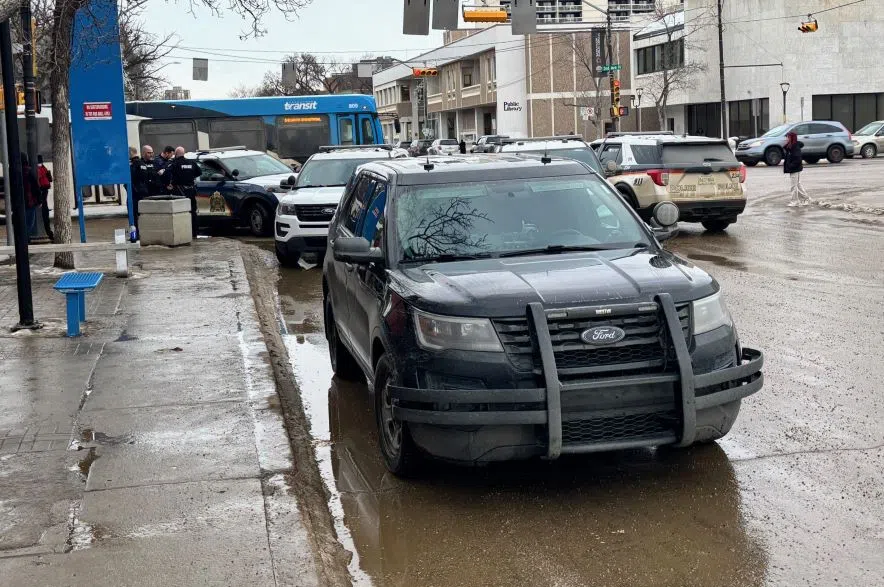City councilors have voted unanimously to look at funding options for a dedicated Saskatoon Police Service transit enforcement team.
A report presented to the city’s transportation committee on Tuesday outlined four options for better security and enforcement on city buses, including two options favoured by council that include a team of police officers. The team would come with a potential cost of $1.6 million over one or two years, and would include a police sergeant, eight officers dedicated solely to transit and two patrol cars.
Read more:
- Saskatoon police briefs: Man facing charges after alleged robbery on Transit bus
- Saskatoon Transit report shows incidents declining, bus safety increasing
- Teen girl arrested after stabbing on Saskatoon Transit bus: Police
Right now, a mix of transit supervisors, fire department community support workers, police and other emergency services provide enforcement on transit buses when necessary.
During the meeting on Tuesday, Darcy Pederson, president of Amalgamated Transit Union Local 615, said the measures taken to date are helping, but they’re not enough. Violent incidents are still too common, he said, and fare evasion remains a chronic issue.
The union head called for a dedicated transit security team to be established in Saskatoon, similar to those in Winnipeg, Edmonton and Calgary.
“The majority of the incidences are intoxication and disorderly conduct, and then there’s acts of aggression and verbal altercations,” he said.
“This is all the stuff that these peace officers or transit security could deal with.”
According to Pederson, transit security could be centred around “hot spots,” the routes and terminals where the greatest number of incidents occur.
But according to Darren Pringle, deputy chief of the Saskatoon Police Service, it’s not possible for a dedicated transit security team to provide the necessary enforcement under provincial legislation, because they are not police officers.
“We’re very different from Alberta, which has four tiers of peace officer. Manitoba has a similar function, and so we’re just different,” he explained. “To bring in a transit peace officer, that concept wouldn’t exist.”
Pringle said over the past few weeks, police officers – including some officers from the guns and gangs unit – have been riding buses on a variety of routes when not on other assignments.
“What I wanted to be able to do was to come and see whether or not we were having an effect,” he said. “Unfortunately we’ve only had about 14 trips that they’ve taken, because I set a mandate of every two or three days to see if we could… happen upon something.”
If it’s approved by council, Pringle said transit team could be up and running in just a few months.
If the funding is approved by council, Pringle said his plan would be to start piecing together a team in January, potentially consisting of new recruits who will begin field training.
“It lets me be a little bit more selective of the people, because you have to want to do the work, and that’s a key piece,” he added.
Because the Board of Police Commissioners allocates police resources rather than city council, Pringle was asked whether he could guarantee that any potential funding would actually go towards a transit team.
“What I prefer to do is sign some sort of service level agreement that would speak to that,” he said.
Robert Clipperton, a member of the Bus Riders of Saskatoon group, joined Pringle and Pederson in expressing concerns over chronic fare evasion – an issue which a representative from city solicitor’s office said would soon be addressed through a new bylaw, which is currently in development in consultation with the police force.
The cost estimates for a future transit police officer team will be presented to city councilors at budget deliberations, which are coming up at the end of the month.











